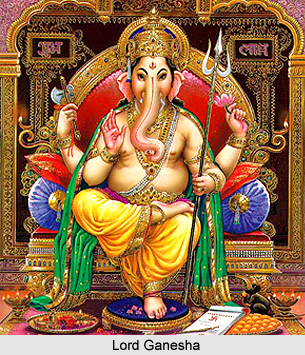 The Vallabha Ganapati Vrata is one of the vratas of Lord Ganesha. This ritual is performed to worship to the Vallabha Ganapati form of Lord Ganesha. Maha Vallabha Ganapati is portrayed with four arms and holds a sacred Kamandalu filled with gemstones in His trunk. This vrata is widely followed in Bengal to appease Lord Ganapati to receive blessings for development or financial improvement. Children are invited by the performer and are worshipped as forms of Lord Ganesha. They are presented with foods, dresses and sweet balls or modakas.
The Vallabha Ganapati Vrata is one of the vratas of Lord Ganesha. This ritual is performed to worship to the Vallabha Ganapati form of Lord Ganesha. Maha Vallabha Ganapati is portrayed with four arms and holds a sacred Kamandalu filled with gemstones in His trunk. This vrata is widely followed in Bengal to appease Lord Ganapati to receive blessings for development or financial improvement. Children are invited by the performer and are worshipped as forms of Lord Ganesha. They are presented with foods, dresses and sweet balls or modakas.
Legend related to Vallabha Ganapati Vrata
There is a legend associated to the Vallabha Ganapati Vrata. Marici was the mind-born son of Lord Brahma. One day, Brahma told Marici that Lord Ganesha was the form of eternal Brahman. Hence Marici engaged in deep meditation and performed tapas on the elephant-headed deity. The Lord was pleased with his devotion and blessed him. Ganesha bestowed a boon to Marici that the divine mother will be born as his daughter and Lord Ganesha will become son-in-law.
Afterwards Marici discovered a conch shell that was metamorphosed into a female child. The infant was named Vallabha. After his daughter became an adult, Marici got her married to Lord Ganapati. Moreover, Lord Vishnu and Goddess Lakshmi also decided to marry their 12 daughters to Lord Ganesha as well. Thus the elephant-faced god as married to them as well. As the Hindu god was married with Vallabha, He was known as Vallabha Ganapati.
While the Vallabha Ganapati Vrata is performed, the devotees recite the Maha Vallabha Ganapati Mantra which is mentioned below-
Om Sri Maha Vallabha Ganapathi Mantra
Suklam Baradharam Vishnum
Sasi Varnam Chaturbhujam
Prasanna Vadanam Dhyayet
Sarva Vighnopa Santaye
Dhyanam
Vande Maha Ganapatim Madanari Soonum
Vamoru Samstha Vanitha Bhuja
Veshtitangam Valleesa Poorvaja
Mabheeshtadam Asritsnsm
Vaneepati Pramukha Deva Ganarchiangrhim
Leelabajam Dadimam Veena
Sali Gunjaksha Sooktrakam
Dadhaduchishtha Namayam
Ganesa Patumechaka
This article is a stub. You may enrich it by adding more information to it. You can send your write-up at content@indianetzone.com




















